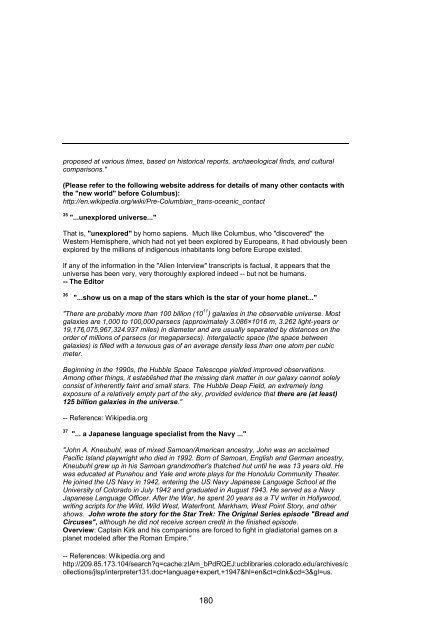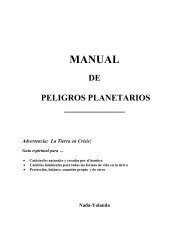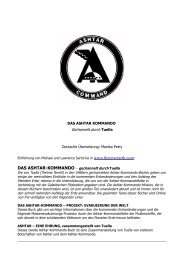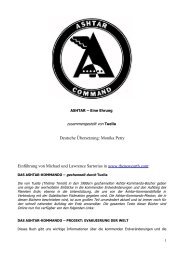ALIEN INTERVIEW - THE NEW EARTH - Earth Changes and The ...
ALIEN INTERVIEW - THE NEW EARTH - Earth Changes and The ...
ALIEN INTERVIEW - THE NEW EARTH - Earth Changes and The ...
You also want an ePaper? Increase the reach of your titles
YUMPU automatically turns print PDFs into web optimized ePapers that Google loves.
proposed at various times, based on historical reports, archaeological finds, <strong>and</strong> cultural<br />
comparisons."<br />
(Please refer to the following website address for details of many other contacts with<br />
the "new world" before Columbus):<br />
http://en.wikipedia.org/wiki/Pre-Columbian_trans-oceanic_contact<br />
35 "...unexplored universe..."<br />
That is, "unexplored" by homo sapiens. Much like Columbus, who "discovered" the<br />
Western Hemisphere, which had not yet been explored by Europeans, it had obviously been<br />
explored by the millions of indigenous inhabitants long before Europe existed.<br />
If any of the information in the "Alien Interview" transcripts is factual, it appears that the<br />
universe has been very, very thoroughly explored indeed -- but not be humans.<br />
-- <strong>The</strong> Editor<br />
36 "...show us on a map of the stars which is the star of your home planet..."<br />
"<strong>The</strong>re are probably more than 100 billion (10 11 ) galaxies in the observable universe. Most<br />
galaxies are 1,000 to 100,000 parsecs (approximately 3.086×1016 m, 3.262 light-years or<br />
19,176,075,967,324.937 miles) in diameter <strong>and</strong> are usually separated by distances on the<br />
order of millions of parsecs (or megaparsecs). Intergalactic space (the space between<br />
galaxies) is filled with a tenuous gas of an average density less than one atom per cubic<br />
meter.<br />
Beginning in the 1990s, the Hubble Space Telescope yielded improved observations.<br />
Among other things, it established that the missing dark matter in our galaxy cannot solely<br />
consist of inherently faint <strong>and</strong> small stars. <strong>The</strong> Hubble Deep Field, an extremely long<br />
exposure of a relatively empty part of the sky, provided evidence that there are (at least)<br />
125 billion galaxies in the universe."<br />
-- Reference: Wikipedia.org<br />
37 "... a Japanese language specialist from the Navy ..."<br />
"John A. Kneubuhl, was of mixed Samoan/American ancestry, John was an acclaimed<br />
Pacific Isl<strong>and</strong> playwright who died in 1992. Born of Samoan, English <strong>and</strong> German ancestry,<br />
Kneubuhl grew up in his Samoan gr<strong>and</strong>mother's thatched hut until he was 13 years old. He<br />
was educated at Punahou <strong>and</strong> Yale <strong>and</strong> wrote plays for the Honolulu Community <strong>The</strong>ater.<br />
He joined the US Navy in 1942, entering the US Navy Japanese Language School at the<br />
University of Colorado in July 1942 <strong>and</strong> graduated in August 1943. He served as a Navy<br />
Japanese Language Officer. After the War, he spent 20 years as a TV writer in Hollywood,<br />
writing scripts for the Wild, Wild West, Waterfront, Markham, West Point Story, <strong>and</strong> other<br />
shows. John wrote the story for the Star Trek: <strong>The</strong> Original Series episode "Bread <strong>and</strong><br />
Circuses", although he did not receive screen credit in the finished episode.<br />
Overview: Captain Kirk <strong>and</strong> his companions are forced to fight in gladiatorial games on a<br />
planet modeled after the Roman Empire."<br />
-- References: Wikipedia.org <strong>and</strong><br />
http://209.85.173.104/search?q=cache:zIAm_bPdRQEJ:ucblibraries.colorado.edu/archives/c<br />
ollections/jlsp/interpreter131.doc+language+expert,+1947&hl=en&ct=clnk&cd=3&gl=us.<br />
180





